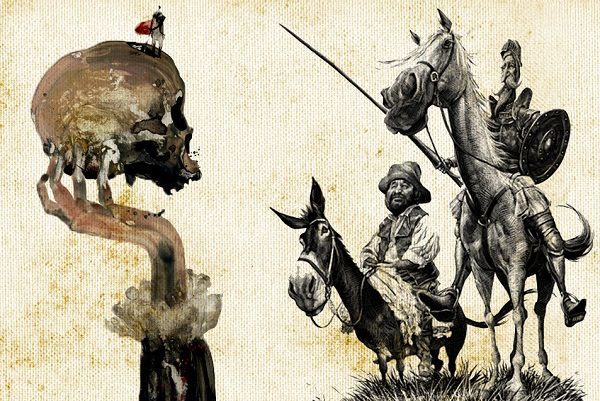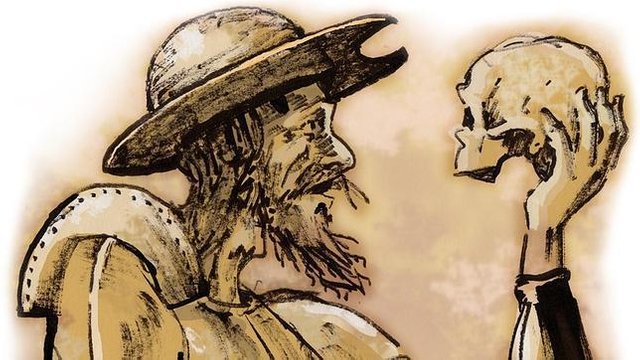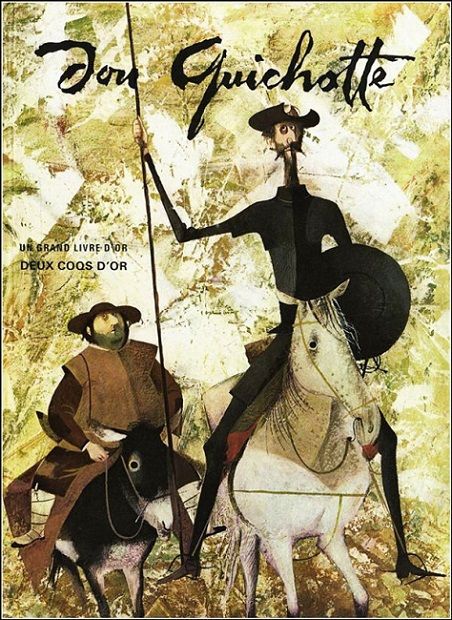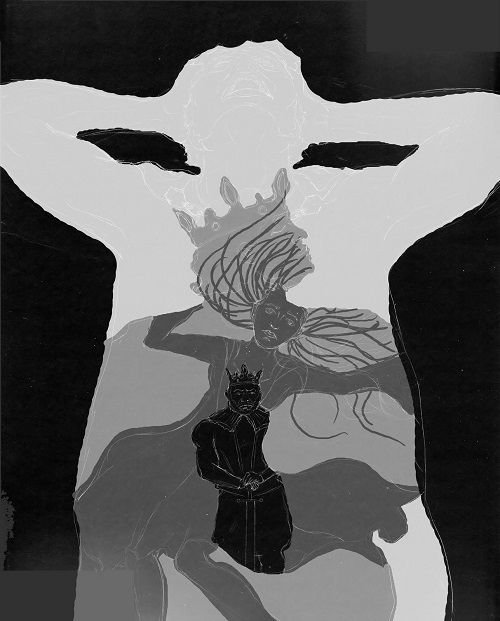The madness in Hamlet and Don Quixote
The immortal images of Don Quixote and Hamlet have excited thinking people from different times and peoples. They attract the interest of modern man. Literary scholars, philosophers and psychologists have written many pages to clarify their essence, compare them, and look for similar traits and differences between them. Indeed, at first glance, they seem to have nothing to do with them. Can they look like Denmark's brilliant high-educated prince and the impoverished Hidalgo thrown away by the fate of the deep Spanish province, lost its mind by reading the mediocre crazy knightly novels. In front of the physically perfect Hamlet, Don Quixote, and outwardly looks like a pathetic cartoon. However, this is only at first glance. By living philosophy, moral beliefs and deeds, they resemble one-sided twin brothers, a child of the same historical age - the late European Renaissance, very often characterized as a "Renaissance crisis." The essence of this relic is rooted in the fact that Hamlet, and Don Quixote are the same aesthetics, of the same approach to art as opposed to the poetry of the ideal and the prose of reality. An elegant way of presenting this contradiction is the depiction of madness. Thus, anyone who carries in his heart the ideals of honor, freedom, beauty, justice and love seems crazy in the eyes of pragmatically oriented people. The Renaissance marks the end of the Middle Ages with its ignorance, asceticism, scholasticism and cruel domination of the church, and proclaims the beginning of new times - of libertarianism, of faith in the forces of man, the flowering of science, art, culture. The man of this age gets a new self-esteem. He no longer hopes only on God, but relies above all on himself. Don Quixote and Hamlet are the bearers of the sublime Renaissance ideals. The living conditions of life, however, do not allow them to realize them in life. They are exceptional personalities, but they can not overcome their more objective circumstances. This makes them truly tragic heroes, misunderstood and declared abnormal. Don Quixote and Hamlet declare war on evil in the world. Hamlet can not cope with injustice because he is active and honest, but he can win - no strength. The loneliness of the hero ultimately strengthens the hero's tragedy. Sam against crime, lying and vicious, he immerses himself in a "sea of ??torment" and wants to put an end to them. Don Quixote opposes the evil in life, but the Cervantes hero acts without thinking, and in his recklessness he is convinced that he will achieve his goal. Don Quixote and Hamlet are masculine fighters. One with pretended, and the second with frank madness, goes to battle with unrighteousness. Both are equally "reckless".
Is not it insanity to stand alone against the ills of life? They are both intolerable, "the hoarse and the scourge of time, the injustice of the mighty, the proud of contempt ... the suppression of laws, the ruin of power ..." Forgotten about themselves Don Quixote and Hamlet unselfishly strive to change the world, restore the harmless harmony in life , to regain the lost moral values, so that man can fulfill his great purpose on earth. In Hamlet and Don Quixote's insanity there is deep wisdom. When he listens to what Hamlet speaks of as a madman, Polonia says: "... this is madness but there is a system in it." After the lion's affair, Don Diego de Miranda is forced to admit that everything in Don Quixote's explanations is measured "The scales of reason." There is a system in Don Quixote's insanity, and where there is a system there is reason, because the system is always a reason. It represents a shaped lifestyle, a set of basic principles of man's attitude to life and people. There are no boundaries between reason and madness in Hamlet and Don Quixote. In this way Shakespeare and Cervantes give mankind the best lessons of wisdom through the mouth of two "madmen". Don Quixote and Hamlet punish evil. They punish him, not revenge. Revenge resolves conflicts between people in a certain circle. It is caused by personal irritation. The punishment is carried out on behalf of the whole society. It is based on generally accepted moral principles set forth in law. Hamlet does not avenge, but punishes. He is personally affected - his father is killed, the throne that belongs to him is usurped. But this is not the driving force of his actions. They are born of something deeper - his soul's harmony can not be reconciled to the torn ties of time, he wants to "fit his distorted joints". Hamlet does not avenge Claudius, the queen and the courtiers. As an objective and conscientious judge he carefully examines all the circumstances surrounding his father's death, trying to penetrate Claudius' soul. Through the simulated madness and through the traveling actors, he clarifies the most subtle psychological details to make sure the king is a criminal and a usurper. Unlike Hamlet, Don Quixote does not thoroughly investigate acts, evidence, and witnesses. He knows his debt and some simple noble rules of life he applies. Hamlet does not avenge Ophelia because she has no fault of him. He punishes her only because she feels a woman's weakness, which in his opinion will inevitably lead her to a crime like his mother's. Hamlet punishes the evil he sees around him, not the people who have done him wrong. He takes upon himself the punishment of universal evil and grieves that he has no time to punish all the crimes committed against man, truth and beauty. Many times Don Quixote declares he is a vindicator of wrongs and misfortunes, and he really punishes them with all the energy of his awake spirit. In him, however, vengeance is lifted up to punishment, because it does not concern cases directly committed against him. Don Quixote says, "I am a knight of La Mancha, my name is Don Quixote, and my calling is to wander around the world to fight against wrongdoing and to punish the wrongdoings ...
The madness in Hamlet and Don Quixote
The main task of my craft is to forgive the humble and to punish the arrogant. "Don Quixote and Hamlet are the tools of universal punishment. Both of them realize that they are such a weapon. They experience the thirst for purity and nobility in human relations, seeking in the interests and deeds of people reason, justice and beauty. Don Quixote is most closely associated with the ideas of humanism through his attitude to freedom. For him, it is one of the most valuable goods for people. It can not compare all the treasures of the earth together. Everything, even life, must be sacrificed for her. According to Don Quixote, man's true nobility lies in his virtues, not his origin. Man excels over others only if he does something more perfect than them. Personal qualities and moral virtues, not his social origin, must determine the place of man in society because "blood is inherited, and virtue is acquired and worth itself more than blood." Hamlet is a prince but holds carefully and humane to the lower ones In his attitude to them there is no hint of haughtiness and sense of superiority. His most sincere and most trusted friend is Horatio, a man sharing his views but not of aristocratic origin. All these details testify that in the aesthetics of Shakespeare and Cervantes madness has become a space for expression of the most intimate human values. In addition, madness is a wonderful means of portraying a person who is ahead of his time. Don Quixote and Hamlet survive the collapse of their ideals, but they both come out morally victorious in the fight against evil in the world. They die as free individuals, and their ideas far outpacing the time they live in. Deep conceptual and moral kinship connects the characters of Cervantes and Shakespeare. Their ideals are also a moral reference to modernity, so we feel Don Quixote and Hamlet as their contemporaries and teachers. Hamlet, like Don Quixote, is convinced of many truths about life in Denmark, but the grief of his father, who embodies the ideal of man, darkens his thoughts.
"See how beautiful it is in this face
hair of Apollo, the lion of Zeus
and the sight of Mars - living law and fear ... "
The high morality and intellectual strength of the prince, his humanistic views of a Renaissance thinker, do not allow him to take reckless actions.
"I want everything to know ..."
For him, only the concrete facts - his father's death and his mother's premature marriage - are not sufficient grounds for action. Hamlet seeks to perceive the visibility of things, find the reasons, judge and convince himself. In this sense, his "insanity" is a recognized need and a means of testing the guile's consciousness, while Don Quixote's madness is the result of a deep psychic collapse, resulting in the most unreasonable thought of becoming a knight. Don Quixote identifies himself as a knight, and Hamlet is a knight in spirit and education, so his ideas are no less significant and elevated than Don Quixote's ideas.
On the steep paths of honor and glory, Don Quixote shows extreme determination, purposefulness and optimism, while Hamlet hesitates, meditates, postpones some actions, even though he has sworn an oath (postpones Claudius). This fact does not make him cowardly and cowardly, he does not take away his glory as a Renaissance hero. That is why I do not accept some skeptical assessments about him - that he is selfish and unbelievers, that he is a skeptic who is busy not with his duty but with his condition. Hamlet, like Don Quixote, does not spare himself - analyzing his actions, blaming himself, becoming self-effacing and laughing at his own inaction (the monk for Hebuba). But inaction is not frustration, the recognition of one's own weaknesses and errors is an expression of spiritual power. Hamlet's sufferings are stronger, more painful and more cruel than any physical pain that Don Quixote suffers in the battles. Numerous Hamlet monologues, and especially the Monologue "Being or Not ...", show that the hero is leaving the battle for his dignified dignity, and he realizes the need to fight a "sea of ??disasters" - selling, hypocrisy, falsity and immorality.
Both Don Quixote and Hamlet appreciate freedom as the ultimate ideal. For Don Quixote, freedom is "... one of the most valuable goods that heaven has given people," and for Hamlet the spiritual freedom of man is a guarantee of freedom and harmony in the world. It is the ideals of the two heroes that have been the basis of their popularity for four centuries.
The evaluations of the two heroes' relationship to women are unfair and unreliable. No one disputes that Don Quixote has no sense of sensuality that he loves the ideal, purely non-existent Dolsine, but Hamlet and his love for Ophelia tend to be biased. They define his words as phrasing. In my opinion, Hamlet is all too complicated because it does not happen on the surface, but deep inside. The wounded and proud soul does not like the display. Hamlet's power is that it submits its feelings of reason - otherwise it would mislead it. The truth about his love for Ophelia was uttered in the collision with Laerte.
"I loved Ophelia; forty thousand brothers
Could not, with all their quantity of love,
Make up my sum "
Don Quixote and Hamlet dying poignantly, not achieving their goals, but not defeated spiritually. Don Quixote leaves behind Sancho - a new Don Quixote, and Hamlet - his friend Horatio, whom he believes and leaves his covenant. Sancho and Horatio will convey the ideas of Don Quixote and Hamlet and will set fire in the hearts of all who are not alien to humanity, justice, and freedom.



